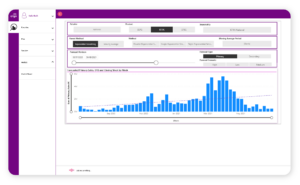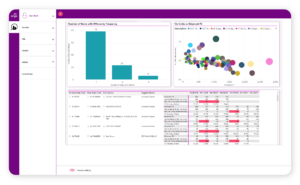As a retailer, managing your supply chain can be a daunting task. From customer demand to inventory obsolescence and stock levels, there is a lot to consider when looking at your supply chain’s efficiency. But with the right supply chain planning solutions in place, retailers can improve profitability and customer satisfaction through optimized planning and inventory management.
Top Retail Supply Chain Challenges
Retailers, as the final and consumer-facing link in the entire supply chain, encounter challenges that may arise from various upstream segments. These challenges can manifest as stock shortages, leading to lost sales, or as over-investment in inventory, resulting in excess stock and subsequent markdowns. Retailers commonly face a number of issues in their supply chain planning, including ensuring product availability and fulfillment, managing the risks of inventory obsolescence and markdown exposure, addressing excess product to maintain a higher return on investment (ROI), and managing the product life cycle, especially for newly launched items.
Product availability and fulfillment
Ensuring that customers have access to the products they want is essential to a successful retail business. Out of stocks can lead to lost sales opportunities while overstocking can lead to increased costs due to inventory buildup. As such, retailers need to be able to accurately predict customer demand in order to ensure the right amount of product is available at all times. This requires careful planning and forecasting of both customer demand as well as supplier ability.
Inventory obsolescence markdown exposure
Markdowns occur when excess stock needs to be sold off quickly at discounted prices, leading to lower returns on investments (ROI) for the retailer. Similarly, over investing in certain products can mean that they become obsolete or unsellable before they reach the customer–another significant loss for retailers who must absorb these costs themselves.
Product life-cycle management
Managing the product life cycle is an important part of any retail business’s success – particularly when it comes to launching new items. Retailers need accurate forecasting models that will help them determine what products will sell well before they hit shelves or online stores so they don’t end up with excess stock or miss out on potential sales opportunities due to inadequate planning.
The Solution to Retail Supply Chain Challenges
Algo’s modular retail platform helps retailers overcome their supply chain challenges with its AI-based algorithms, comprehensive validation and scrubbing processes, and flexible data interface protocols.
Data aggregation and integration
Data aggregation and integration from multiple sources provide valuable insights into customer demands and preferences that can be used to accurately forecast future needs. Automation of replenishment processes ensures product availability across all channels, while optimized allocations to stores and warehouses based on customer preferences, location, and sales forecasts help retailers maximize profits.
The data aggregation feature of Algo’s platform allows for the capture of real-time data from internal systems as well as external marketplaces. This powerful tool helps retailers predict trends in demand, allowing them to adjust their inventory levels accordingly. The data can also be aggregated to understand which products are selling well so that the retailer can focus their marketing campaigns on those products.
Replenishment Planning
Replenishment planning is another key component of our platform that helps retailers maintain optimal product availability at all times by predicting the demand for products in a given area automatically. Our replenishment algorithms use sophisticated machine learning techniques to identify patterns in consumer behavior over time so that they can better predict future demand. This helps reduce excess stock levels which would otherwise lead to higher markdown costs and lower profitability margins for the retailer.
Allocation Planning
Allocation planning is also important when it comes to optimizing supply chain performance as they enable retailers to allocate goods based on customer behavior rather than manual guesswork or outdated methods such as first-in-first out (FIFO) or last-in-first out (LIFO). Our allocation feature uses predictive analytics to determine which items should be allocated depending on factors such as location, customer preferences, sales forecasts etc., resulting in improved inventory management across multiple channels and increased efficiency in process execution.
Demand Planning

Demand planning is yet another critical element of our platform that enables retailers to translate customer demand into actionable plans so they can make informed decisions about pricing strategies, inventory levels, promotions etc., thereby improving profitability margins significantly. By leveraging advanced analytics tools such as forecasting models and price optimization algorithms, Algo’s platform provides an end-to-end solution for maximizing returns from every part of the supply chain process while minimizing risk exposure from unexpected events like pandemics or natural disasters.
Sales & Operations Planning (S&OP)

Sales & Operations Planning (S&OP) provides an integrated view of all operational activities within a business so that resources are allocated efficiently across departments according to projections made by our advanced analytics tools. By giving stakeholders a holistic view into how resources are being used throughout the organization, S&OP ensures that everyone is working towards common goals leading to improved collaboration between teams and better performance overall.
Advanced Analytics
Algo’s modular retail platform provides a comprehensive set of features designed specifically for addressing common retail supply chain challenges with its AI-based algorithms, comprehensive validation and scrubbing processes, flexible data interface protocols and advanced analytics tools enabling businesses to optimize their supply chain planning processes for improved profitability margins
Supply Chain Data Integration
An organization’s data is its most valuable asset. With data coming from different channels and in different formats, ensuring consistency and accessibility becomes vital. Algo enables the seamless integration of consumer demand and related supply chain data. The data is screened through a vigorous and automated validation process providing an ecosystem for supply chain planning with data integrity.
Why Algo?
By leveraging Algo’s powerful platform, retailers can transform their supply chain operations to maximize efficiency and ensure data accuracy. This allows them to make more informed decisions about inventory planning, customer demand forecasting, and other essential supply chain activities. With Algo’s solutions in place, businesses have the confidence that their data is up-to-date, reliable and accessible when they need it most.
Optimize the breadth of SKUs.
Our AI models specifically focus on enabling a retailer to optimize their inventory position across a large SKU breadth within multiple complex product segments.
Speed of implementation.
Our team can have your supply chain powered by Algo in as little as 8 weeks.
Plug and Play.
Algo can be bolted onto any existing systems (ERPs).
For retailers looking to migrate from a legacy system or manual processes to an AI-based solution, Schedule a personalized discovery call today!
About the author

Algo
Combining human centered AI with deep domain expertise, Algo’s analytics enriched supply chain intelligence platform helps suppliers and retailers plan, collaborate, simulate and execute a more efficient supply chain.


